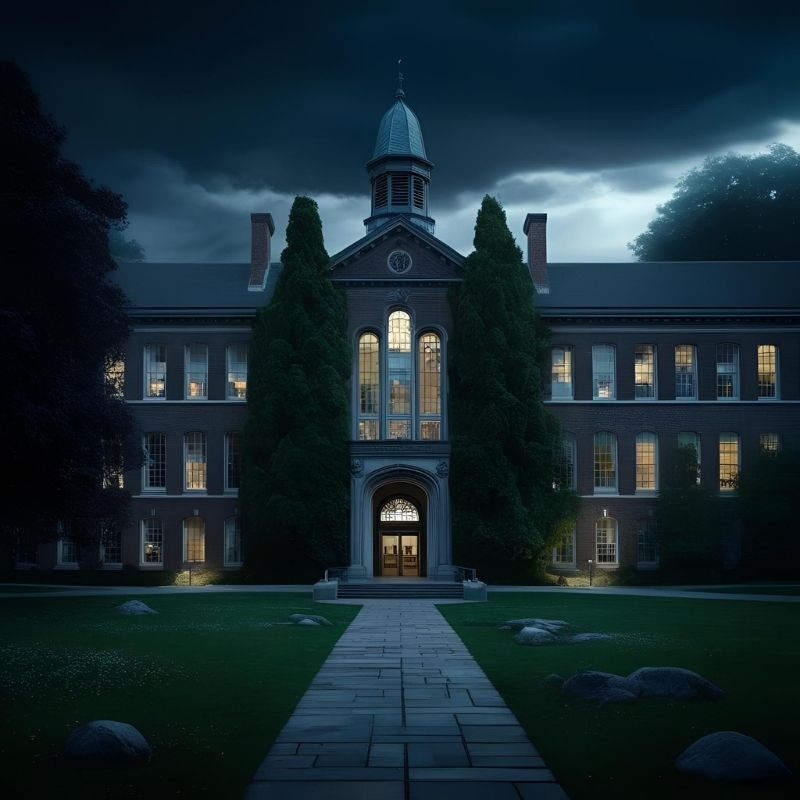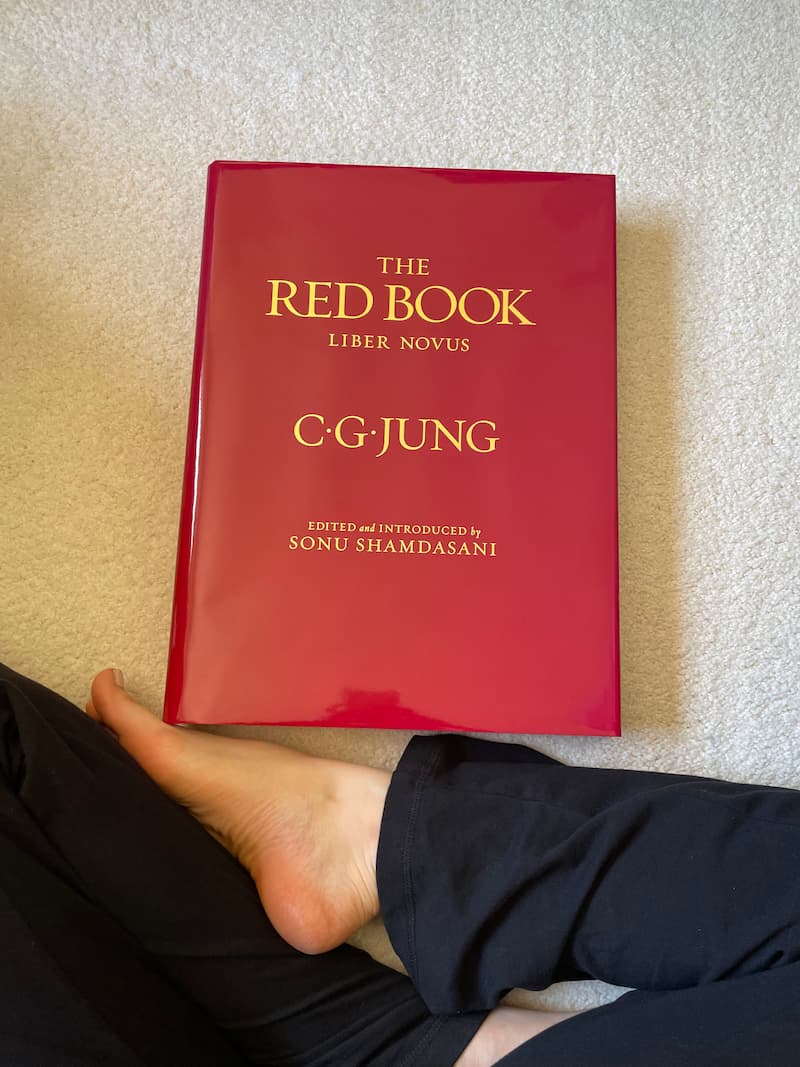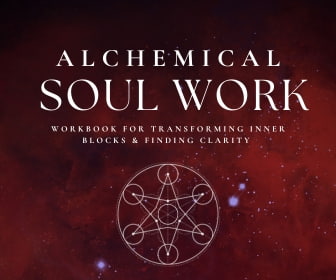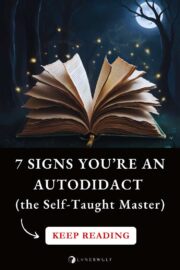Leonardo da Vinci, Eckhart Tolle, Stanley Kubrick, Frida Kahlo, Benjamin Franklin, Krishnamurti, Jane Austen, Steve Jobs – some of the greatest people in history were (and are) self-learners or autodidacts.
As author and autodidact Helen Beatrix Potter once noted: “Thank goodness I was never sent to school; it would have rubbed off some of my originality.”
In a world where formal education is increasingly failing us on numerous fronts and the bite-sized dopamine-fuelled mediocrity of social media is decreasing our capacity to think critically, being an autodidact is more needed than ever before.

Soul Work Compass Course:
Is a vague sense of emptiness lurking beneath the surface? It’s time to reclaim your life. The Soul Work Compass Course helps you break free from self-doubt and repetitive pain. Don’t just survive – thrive by creating a personalized map for your future. Start your journey to profound self-discovery and authentic life direction now.
I’ve recently fallen in love again with my local library, and let me tell you, self-directed learning is empowering and feels wholesome and soul-nourishing in a way that’s hard to express fully.
Not only that, but being an autodidact is a huge part of the conscious and intentionally lived life path and spiritual journey as a whole.
You’ll find that you’ll experience way more synchronicity, bursts of exhilarating discovery, and sometimes even moments of mystical realization when reading and learning.
Learning makes life richer and deeper, so why not embrace being an autodidact?
Table of contents
- 7 Signs You’re an Autodidact
- Why Formal Education Can Limit Your Mental, Emotional, and Spiritual Growth
- I) My Experience With University
- ii) 5 Reasons Why Formal Education Can Be Soul-Sucking
- 1. It imposes pressure on you and an immense amount of stress.
- 2. It robs you of all of your time.
- 3. It robs you of psychological freedom.
- 4. It motivates you with fear.
- 5. It kills your creativity.
- (Bonus) 6 . It creates mental rigidity and a dislike of ongoing learning.
- The Connection Between the Spiritual Journey and Self-Directed Learning
- How to Become an Autodidact (9 Suggestions)
7 Signs You’re an Autodidact

Not everyone is an autodidact. Not everyone has a passion for self-directed learning. Some people are content to learn passively or not at all, and that’s that.
If you’re here reading this right now, I’d say there’s an extremely high chance you’re an autodidact.
But if you’re not sure, here are some signs:
Want to get LonerWolf at the top of your Google search results?
- You’re a high agency person, meaning that you live in an active, intentional, and focused way by taking responsibility for your life and being self-directed.
- You have a lust for learning, and you’re wildly curious – aka, you find joy in researching and discovering new ideas, methods, philosophies, etc.
- You value depth and enjoy long-form content like books, articles like this, long podcasts, and in-depth videos.
- You feel repelled by social media because it feels too shallow, and you don’t like passively consuming superficially regurgitated info-tainment.
- You feel suffocated by formal education as it kills your desire to learn or grow.
- You’re a gifted deep thinker or feeler, what Polish psychologist Kazimierz Dąbrowski called “overexcitability,” meaning that you have a heightened response to external stimuli and stronger reactions compared with others.
- Your idea of relaxation is to sit down with a good book – simple, but self-explanatory. ;)
Can you relate to these signs? If so, congratulations! You’ve just joined the ranks of some of the most creative and innovative people in the world.
Have I missed any signs? If so, share them below in the comments.
Why Formal Education Can Limit Your Mental, Emotional, and Spiritual Growth

Okay, I have a lot to say about this, so get ready.
Firstly, many of the most passionate and talented writers, artists, film directors, philosophers, and musicians out there are vehemently against traditional forms of education.
Mark Twain, George Bernard Shaw, Albert Einstein, and Margaret Mead, for instance, were all highly talented autodidacts who spoke up against the innumerable limitations of formal education.
Bertrand Russel, for instance, was once recorded saying that “men are born ignorant, not stupid; they are made stupid by education“, and Henry David Thoreau was attributed to saying, “What does education do? It makes a straight-cut ditch of a free, meandering brook.”
So, back to the question: Why does formal education often limit your mental, emotional, and spiritual growth? Let’s start with a personal sharing.
Before that, here’s a quick disclaimer: If you’re one of those people who loved university or college, more power to you. You can absolutely be an autodidact and a person who was formally educated. I’m only speaking from my own experience and what I have learned from others who have gone the traditional route. Also, some professions benefit from structured formal learning (doctors, pilots, electricians, accountants, etc.). You wouldn’t want a self-taught surgeon doing triple bypass surgery on you, would you? :) This critique is mainly aimed at the humanities.
I) My Experience With University

I quit university for a number of reasons. One: I hated it. Two: I learned very little. Three: It was slowly poisoning my love for self-directed learning.
In fact, during my years at university, I stopped reading, I stopped inquiring, and I stopped doing what I loved the most: writing – which was ironic because I was studying to become a librarian at the time (later contemplating being a psychologist).
Would you like to save this?
Your information will never be shared.
Here’s the reality: all passion, drive, and curiosity to learn about the mysteries of life slowly evaporated during my years in formal education.
The days, weeks, and years of homework, assignments, mandatory readings, and exams slowly drained me of my creativity and lust for life, like a cancerous tumor.
All I can say is that thank god I finally came to my senses one day and quit, for good.
Luckily, I’m not the only deviant “college dropout” who holds these sentiments. In fact, many people, from Maya Angelou to Bill Gates, never completed college or university.
Of course, not all college drop-outs do well in real life – that’s a misconception. But there’s nothing wrong with opting out of formal education, especially if it’s killing your love of learning and therefore constricting your ability to psychospiritually grow and transform.
ii) 5 Reasons Why Formal Education Can Be Soul-Sucking

I realize that some people love the experience of formal higher education – and sure, there are benefits. More job security (in some cases), networking, building new friendships, group learning, unique opportunities, and so on.
Don’t get me wrong; you can be both an engaged student and a passionate autodidact – they don’t necessarily cancel each other out.
But I’ve observed that the more deeply steeped in formal study a person tends to be, the more the sacred love of learning begins to wither and die.
Here’s why formal education can be so soul-sucking:
1. It imposes pressure on you and an immense amount of stress.
Basically, the rule is “if you don’t learn this by this time, you’ve failed.” Deadlines create an immense amount of stress and pressure, and this is not a healthy approach towards learning.
I remember the feeling of pure, breathtaking freedom that came with quitting uni forever. It was as though a heavy mental burden had been lifted, and I suddenly came to realize how much psychological tension the whole institution had put me through.
The amount of anxiety you have to deal with while studying is completely unnecessary.
2. It robs you of all of your time.
Hours of dutiful reading, hours of highlighting textbooks, hours of strained eyeballs staring hopelessly at the computer screen … Forget cultivating any meaningful interests or hobbies, studying eats up all your energy, time, and life force vitality.
3. It robs you of psychological freedom.
During my stint as a uni student, I noticed this bizarre phenomenon happening inside of me. Whenever I stole a few minutes or hours for myself, I often felt guilty and edgy, as though I was doing something illegal. Basically, my mind was craving to study, not out of free desire, but imposed fear that I was somehow slacking off or not working hard enough. Talk about servitude.
4. It motivates you with fear.
In many parts of the world, we’re taught from a young age that if we want to be special, successful or amount to anything important in life, we must slave away for 3-4 years to earn a slip of paper that entitles us to a “bachelor” or “masters” title.
For over 12 years, we've poured our hearts into creating free content on this website. Unlike many platforms, we believe this guidance should be accessible to everyone. If this post empowered you in any way, please consider making a donation to keep us going. Any amount (one-time or ongoing) makes a huge difference.
Most people go to college either out of parental obligation or paranoia. Both are motivated by fear.
5. It kills your creativity.
Everything in colleges and universities is predetermined, from the syllabus to the resources, set readings, and excursions.
College tells you what to do and expects you to follow implicitly. You must walk within their strict boundaries at all times, using their limited materials to answer their limited questions in their limited formats.
Wild, unbridled curiosity is discouraged. Dull-minded conformity is promoted instead.
(Bonus) 6. It creates mental rigidity and a dislike of ongoing learning.
As Albert Einstein was recorded saying,
“One had to cram all this stuff into one’s mind, whether one liked it or not. This coercion had such a deterring effect that, after I had passed the final examination, I found the consideration of any scientific problem distasteful for an entire year.”
If even famous physicist Albert Einstein was turned off science by formal education, imagine what effect it has on us!
Even I experienced this with my “library science” studies. I love libraries and what they stand for, but after studying to become a librarian, I truly came to understand the meaning of the word “abhor.”
The fact is, many formal education institutions cram a bunch of knowledge into your brain and expect to make a professional out of you while slowly killing your capacity to be curious and creative.
Sure, you may have finally gained your socially acceptable degree, but the years of stress and dutiful learning have created a rigid, institutionalized brain.
Furthermore, those of us who have undergone the torture of education camps will understand how nauseating the word “education” becomes after graduating.
Who the hell wants to become a “lifelong learner” and much less an autodidact after experiencing the stress of a formal education?
It took me ages to get interested in self-directed learning again after serving my time at uni – about a year and a half (some never get it back). Unconsciously, I identified any form of education with classrooms, exam papers, and hours spent squinting at dry textbooks.
Thankfully, I gradually realized that obtaining knowledge doesn’t have to be excruciating and burdensome, and I’m glad I did.
These days, being an autodidact is my “bread and butter” – or how I make a living for myself, thanks to the democratization of learning via the internet.
Sadly, many people come out of college and never look back, losing all interest in learning and growing, thus missing out on a whole side of life – one that is rich with the rainbow of other people’s lived experiences, lessons, and insights.
The Connection Between the Spiritual Journey and Self-Directed Learning

As I mentioned previously, being an autodidact is a huge part of the spiritual journey and path of healing.
In fact, without a curiosity to learn, explore, and expand our intellectual horizons, fuelled by inner passion, we can easily become mentally, emotionally, and spiritually stagnant.
How can we grow, heal, and transform without being open to learning new things about ourselves, others, and the world around us?
Yogic philosophy calls this self-directed learning path Jnana Yoga, which involves contemplation, meditation, self-inquiry, and swadhyaya or self-study.
Using a Western philosophical approach, we can see that this drive to self-educate and evolve comes from the inner genius or daimon – the guiding force of the higher Self who influences what you’re interested in and attracted to, without you making a conscious choice.
To be an empowered autodidact, you need to be able to listen to this inner call and follow your passion and curiosity, trusting that what you’re drawn to is from your Higher Self, who is drawing it into your life for a good reason.
This entire website is a shrine, in a sense, to autodidactic, self-directed learning. So I welcome you to go as deep and as far as you want. The Spiritual Awakening Bundle is an illuminating place to start if you want highly researched, top-tier information on your self-directed learning path.
How to Become an Autodidact (9 Suggestions)

Perhaps you’re reading this and aren’t quite sure whether you’re an autodidact or not. Or maybe you want to embrace this part of your nature more fully.
Whatever the case, autodidacticism has the following benefits:
- makes you smarter,
- enhances your creativity,
- relaxes your mind and body,
- boosts your enthusiasm about life,
- gives you more meaning and direction,
- helps you to master problems,
- makes you feel more empowered,
- reminds you that you’re not alone,
- increases your understanding of others,
- elevates your self-awareness and insight
So how can we become autodidacts? It’s quite simple, really, and actually very enjoyable.
Below are a few ideas, which I hope you can add to in the comments:
- Read far and wide, and embrace reading weird things that appeal to you. Read what everyone else reads, and you will think the way everyone else thinks. Get curious and adventurous. If you usually read fiction, try reading biographies, psychology, or occult non-fiction books. This will help to open doors and open your mind. See my article on bibliotherapy for more suggestions.
- Befriend your local library. I love the library because of the wealth of free information it possesses. It’s also the perfect place for the introvert to spend a comfortable and quiet afternoon. Often, libraries also have events running every month, some free, others charge a small entry price. Go to your local library and start using it more – you won’t regret it!
- Watch documentaries, films, and other visual media from around the world – don’t just stick with your culture. Expand your perception.
- Ebooks are your best friend if you’re a heavy reader, especially of non-fiction. I love the ability to highlight and save notes while I read to eventually revisit later. I currently use a Kindle e-Reader (it has lasted me 10+ years, so a good investment!) but it’s painfully slow, so I’m thinking of upgrading to a Kobo later this year, which let’s you read books from your local library. Check out my Spiritual Awakening Process, Awakened Empath, Mindful Shadow Work, and Old Soul books for some insightful reads.
- Selectively subscribe to high-quality newsletters. I tend to be extremely careful when it comes to whom I choose to stay subscribed to. Receiving hundreds of emails is not only annoying but also mentally overwhelming. If you like someone and their work, subscribe to their newsletter, but do so mindfully. There are so many delightful golden nuggets of insight that may come your way. I have a newsletter that is aimed at helping sensitive spiritual wanderers find clarity, healing, and purpose on their awakening paths. If that resonates with you, here’s the free newsletter (only 1-2 emails per week, and you can unsubscribe at any time).
- Online courses can be empowering in small doses – and as a self-directed, high-agency person, I prefer the go-at-your-own-pace ones. But generally, you pay more money for courses than books because of the high production value of the content and other elements like group accountability, tests, forums, etc. I generally tend to choose books instead (although I do make exceptions).
- Podcasts and audiobooks are great if you’re busy and on the move a lot. I treat this format like my inbox: I instantly stop listening and “opt out” if the content is low-quality or too rambly. So curate your collection and keep it clean to avoid clutter and overwhelm.
- Avoid McLearning – a new word I’ve coined. McLearning is “fast food” learning that is delivered through short snippets, catchy quotes, witty tweets, TikTok videos, Instagram Reels, etc. It’s mostly just fluff and regurgitated, half-thought-out ideas. Steer clear.
- Practice intellectual humility – as Socrates once said, “I know only one thing: that I know nothing.” Being an autodidact isn’t about being a know-it-all; it’s about curiosity, exploration, and lifelong learning. Keep a beginner’s mind and allow yourself to be continually surprised – it keeps life spicy.
- (Bonus) Follow your passion, not your “shoulds.” No matter whether you’re learning to be a self-taught musician, writer, artist, programmer, or cook, follow the inner call of what actually appeals to you. Don’t let the inner Judge or Perfectionist tell you otherwise. Passion is self-motivating and the easiest and best way to learn new information quickly.
***
The autodidact is a person who is not restrained by lifeless, repetitive, fear-induced learning but one who can freely explore the world with ingenuity, uniqueness, and passion.
They learn out of a deep inner desire to learn, and not just because they have to. In fact, the autodidact’s approach to education is highly intelligent: learn whatever you wish out of free will, and you will absorb and retain much more.
Self-directed learning not only gives you the knowledge to deal with life’s problems much more effectively, but it’s also non-discriminative.
Any person of any intelligence level with any amount of money can become an autodidact.

Stuck in the same old story?
Write a new one. The Alchemical Soul Work Workbook empowers you to become the alchemist of your own life. It provides the tools to dissolve old narratives and transform pain into power, giving you the freedom to create a future that is authentically yours.
And that is the beauty of this inner calling and life path.
So, are you an autodidact? What are your favorite resources or self-directed practices? I’d love to hear below!
Two paths to inner transformation – here’s how I can help you go deeper:
1. The Soul Work Compass Course: Feeling lost or stuck in repetitive cycles of pain? The Soul Work Compass Course is your guide to reclaiming your true purpose. In this deep yet practical journey, you’ll learn how to heal core wounds and create a tangible "Soul's Compass" to navigate life with clarity. Enroll now and find your True North!
2. The Inner Work Journal Bundle: Ready for deep transformation? This bundle includes three powerful journals – Self-Love, Inner Child, and Shadow Work – with 150+ prompts to heal wounds, integrate your darkness, and experience bone-deep change. Digital & printable. Print unlimited times.

 $3
$3
My journey for self-motivated learning happened in Architecture school. UWA. They told us to “google” videos and “how to do it” clips for assistance with learning computer programs. Specifically, they said that they had no time to teach us these so we should self-learn. This was a course I did specifically to learn skills as I had none (due to my last degree).
My response: “OK! I will drop this degree and learn by myself then without FEES. Then I will not be stressed all the time about how I was not taught do something properly for a meaningless assessment DUE.I already have BA in Art History so I have an excellent point of reference and understanding of art movements anyhow. Now, I do the REAL practical side of art in my city which happens to be the CENTER of art and culture! There are festivals, art lessons, performing artists and open house activities ALL THE TIME. I actually have the time for it, too. LIFE IS SWEET!
Nice!
You are absolutely correct about this article! Before I attended college I would always read books for enjoyment and pleasure. But ever since I have attended, and over the course of my college experience, it slowly drained out my curiosity, passion and motivation. I barely read books anymore, let alone touch them, absorb uninteresting information for the sole purpose of regurgitating it on a piece of paper and the inability to retain it thereafter, and finally, makes me indifferent to the world. As the semester is about to end, I am planning of not coming back and deciding to teach myself how to program.
Now college is not totally useless, because there are people who have become successful by getting a degree, depending on how you define “success”. It can land you a job that ACTUALLY requires a degree. I mean you wouldn’t trust a nurse or a doctor who have never been to a university would you? When it comes down to it everyone should realize that college is not for everyone. But saying that you need to have a college degree in order to have a better life is nonsense.
I think the only reasons I ever made it through college were the facts that I have an exceptional memory, and went into it with a great deal of prior autodidactic education: certainly if I had to actually study all the time I wouldn’t have been able to put up with all that structured nonsense! I mostly just picked electives that covered topics I was already fairly well self-educated on. Psychology 101? I gave the textbook chapter a once-through an hour before each exam and never touched it otherwise. Astronomy? I finished the professor’s sentences for him because I’d read most of the info in books I picked up on my own a decade prior. And for a major, I went with art, because even though it had the highest number of credit-hours of any major at the university, it left me a lot of leeway to do (or make) whatever the heck I felt like. Despite the art degree, I’m now writing a column in a nationally-published magazine on, of all things, botany—which I never took a single class on in my life (unless you count that one botanical illustration workshop I went to when I was 10…).
What I’m really getting at is that if academia stifles the daylights out of you but you still want that degree, you might try to spend some time reading and teaching yourself about a bunch of things that interest you, and THEN show up at college and apply the knowledge you already have to your courses, to lighten the burden.
…Not that I’m actually doing anything “productive” with my degree, mind you—but it appeased my parents!
For me, the stress is a different flavor.
I go into class, wanting to really dig into everything they present me, to explore every little path. It is like being presented with an all you can eat buffet with a small stomach. I cannot possibly try everything and store it in my long term memory, no matter how much I yearn to. It doesn’t feel negatively forced upon me so much as too much of a good thing, that I can’t juggle.
Sometimes I do feel melancholy and unmotivated. The world is so big, so diverse, and so fascinating. And the fact that I cannot fully integrate and process the things I am interested in- i.e., pretty much any subject you would care to name- makes me feel lost.
But, I think that’s not entirely because of school. If left on my own, I will meander aimlessly through information, gathering what I believe are important bits and trying to interlock them into a larger, looser tapestry. I enjoy it a bunch, and love whipping out small arcane pieces of information all the time. However, at present I lack the focus to commit to one line of inquiry and dive deeply into it. I’ve spent a few years out of college and nothing came of it but more of the same. I sometimes envy those who feel pulled strongly in one, or a few directions. Those who can choose with ease.
College at the very least gives me a path.
When I was in high school, I did not experience this feeling of “glut” of information. I vacuumed it all up, and I’m still burning with curiosity to this day. I wasn’t really a self-learner then, unless you count constant inquiries to my also smart parents and watching Animal Planet. I am more, now. The real problem is, I never developed good study habits because I never had to, I got through with relative ease. I still struggle with that.
My brother is diagnosed with ADD, and I suspect I might have it, too. However, due to some self-learning rambling through alternative methods like biofeedback and its predecessor meditation, I’ve decided not to take medication for the time being. The concept of “Big Pharma” certainly is popular in autodidact circles, and I’ve gathered enough doubt in mainstream medicine to give the accusations against it some credence.
Of course, I went to a private school which used some self-directed projects, and lots of hands on learning. One teacher earned his PhD in describing learning styles. So of course I wouldn’t expect my experience to be illustrative of the education system at large. All I can offer is, institutionally, it *can* be done right. There are increasing calls for self-directed, mentored learning. Don’t write off school models completely, work to create better (and more affordable) ones for the next generation!!! Work with school programs or offer to guest lecture on fun topics. Lead Boy Scouts or some other similar peripheral learning organization. You’re possibly in the best position to expand others’ educational experience and spread more useful learning. Help *cultivate* curiosity. For kids who are probably not autodidacts, it will be a breath of fresh air. For the kids who drop out, not because they are autodidacts, but because the school fails to stimulate any interest in learning amidst the tide of anti-intellectual pop culture, it might just be a godsend.
After I graduated highschool, I wasn’t able to go to college for two years due to some unforeseen difficulties and I felt so horrible, like I thought I’m doomed forever, but last year I was able to go to one and I realized how I’m so not missing out on anything. Honestly, I learned more in my free time than I did in the university. Yeah maybe it felt better when people ask me what school I go to because from where I am, young people out of school are looked down upon which is really sad. And so after a year (recently) I didn’t go back to college and this time, I don’t feel bad as I did before. I’m one of those people who simply want to learn everything, I’m not a top student but I do well in school but like you said, it puts limits in what I’m really capable of. So now, I’m having a lot of fun learning on my own. And seeing my old batchmates who graduated early and yet still unemployed just proved that it doesn’t really make that much difference. Well, guess I’m one of you guys. Lol.
I received a BS in Physics from Oregon State University, after attending two other universities. Why? Because the other schools were content to grant degrees in physics to people who didn’t know physics. The department changed its curriculum when they began testing their students when the new quarter began, the results weren’t graded, the profs simply wanted to know how well their undergrads understood the material. The results, mass confusion, almost all of the test takers knew none of the concepts, didn’t know which formulas were the ones which went with which topic, they had no real understanding of the subject matter. Several of them had received top grades, but all they had done was memorize the material.
Understanding that their first priority was teaching, OSU Physics went to a capstone/paradigm model of teaching, meaning that along with the traditional classes, they also had divided the subject into month long seminars, where first principles, in both math and physics, were taught. The students were encouraged to ask questions and discuss the material, rather than having the profs completely in charge to pedagogy. The result, we learned far, far more of WHY physics works, that math was created to supplement science, rather than supplant it, and we came to understand that physics was a self balancing, self explanatory field of study, which could be understood by anyone with normal intelligence. But, the primary focus was on student self education, discuss and debate the topics, to read source material, in order to get at what and why the leading lights in the field discovered and believed were the salient points of the science….
I’m not totally in agreement with this article, at least for me, because I have NOT been turned off by formal education, though it is very tiring. Although it has all the faults you described and more, you can always find the light in the dark, find the knowledge actually buried deep in there. From that starting point, I went on to a lot further heights. I did the 4 years and medical school, all the necessary work to become a psychiatrist, and afterwards I did feel a bit against actually going online, or even to the local library and picking out a book or article to learn from, but I quickly got past that as my hunger to learn overpowered my comparatively powerless protests. But that’s just my own experience, and most autodidacts that I’ve met usually are smarter than most in their chosen field, but their general knowledge is a bit lacking. I’m not trying to say anything against autodidaction, I intensely admire people who have managed to do it, I’m simply making an observation. Thank you for posting this article, I truly enjoyed it.
Autodidact is a label others gave me that I grabbed onto. For me traditional learning would not work. My teachers and the professional labeled me ADHD and dyslexic which while possibly accurate, certainly did not promote my desire for educational achievement. So, with High School completes I went my own way. While I am more expert in certain areas than those with doctoral degrees, I do not look down on those whom have gained their knowledge through the educational systems even though some of them try to look down on me. Perhaps it is because I am living proof that the higher education system that they put so much into is not necessary. That said, perhaps I would write much better had I gone to college.
Bonjour Luna !
What an essential and enhancing article it is :D !
I’m a “college drop out” and an autodidact and have always been (I’m 25 now). It simply took a long for me to understand it. Before I believed I was depressed and therefore couldn’t concentrate on anything, couldn’t submit to any discipline just because of the fact I was suffering from depression. I was jealous of other people and was wondering what the hell was going wrong with me. I always took some very good notes at school and was congratulated by my teachers, so why would I degenerate now ?
But a few weeks ago I understood it was normal. It was in my genes, in my blood, and it wasn’t depression at all. But this is hard to realize – and to accept – it. As you maybe remember I’m living in France, an “over-rational and academic” country (where this rational spirit may even get close to some kind of a moral and spiritual State dictature) where being an autodidact may condemn you to a lot of pain if you don’t find an idea to found your own business and work to your account (this is my case, or else I would do everything to be a self-entrepreneur), freed from abusive hierarchies. Since we all have to survive in this utilitarianist world of shit, being a slave of bureaucratic, mercenary and boring jobs is very hard when you are a free-minded and strong-willed autodidact. And gods know how French administration is very hard with people trying to found their own business, to get free from “modern slavery”…
So, this is my lot, the dark side of the fact of being an autodidact. As an autodidact hating authority, I have to endure it all the same to earn the money necessary to my independance.
But there is also another dark side : if my family has always understood my choices and sustained me, some of my friends and colleagues are unable to leave me in peace with that. For so many years I had to endure their “well-intentioned” criticism : “I don’t understand ! You are so young, so clever and highly cultured, you have a so high potential, so why are you losing yourself in some shitty jobs ? Go back to study ! What, you don’t want ? I think this is because you are lazy, or depressed because of your job and have to go and see a psy. Start a therapy and take some antidepressants. I even think you are gifted : you should test your I.Q., because you’re wasting yourself ; you’re so good at writing, why don’t you become a writer ?, etc.”
Frankly, I ask these people nothing and they are here to annoy me yet I owe them nothing. This is my life, not theirs. But I think that my way of being worries them : I’m out of all discipline, of all submission, I’m some kind of a mix between a misfit and a gentlewoman and I think this sends them back to their own childish insecurity, since they all got university diplomas, since they all went through traditionnal and classic learning. So, by trying to control me, they maybe try to control their own fears. But this is an illusion, a fancy of their own creation, of course.
I used to doubt a lot because of these “fusionnal” friends. But this isn’t the case any more. All I’d like now, would be to be spared of those critics. Who are they to tell me what I should do ? This is all what annoys me : people who take themselves for what they are not. And they are not allowed to give me some moral lessons in any way.
It is true that all my life I’ve been taken for an alien by so many people… But I think it will never change : I’m out of any social, moral and intellectual narrow-minded category.
I’ve learnt a lot by myself and shall go on this way… As a polymath, this is simply hard not to flit around. I know a few about a lot of subjects… I go beyond any specialization. And as a “discipline drop out,” this is hard to find short formations – and then to accept the discipline they involve – in order to begin a professionnal reconversion, to then find a job I would really like. But I must say, nothing pleases me. All is about bureaucracy, this bureaucracy I hate so much. I wish I work in the field of culture, philosophy or art…, or in the social field, to help people in need, but all is corrupted by money, utilitarianism and bureaucracy, even in this field (and gods know I investigated a lot to come to this conclusion).
Anyway, I know a lot of people who got university diplomas, in the field of culture, literature, art, cinema…, or in any field you want, and who can’t find any corresponding job. So they have to work in an office, doing “mercenary” tasks, just like me. Their diplomas allowed them to get some cool time when they were students, but finally me and them now are on the same level. They simply are paid better than me because they do have some diplomas that I don’t have, even if I am more experienced in the job than them because I began to work when they were still studying !
Also, one of my friend said once : “I studied to be a manager, and I got the diploma. Our teachers told us we would be managing this world. And I found no job as a manager. Now, I’m a simple employee in a gardening store. Studies are useless. You’re sold dreams.”
So if being an autodidact is natural to a human being, surviving into a world that despises and rejets autodidactism can be very harsh to live.
I remember that some months ago I had had a very interesting conversation with Mateo on his article entitled “Commitments, the quiet leeches of life” that you have linked in your above article. Both your articles complete each other wonderfully :) .
Now I’m about to read all the comments that were written following your article. I’m looking forward to discover the others’ experiences :) .
“What an essential and enhancing article it is :D !”
Oops, I meant to write “enchanting” and not “enhancing”. I doubt that “enhancing” in this case would mean something ?
Hi Marina :) great to hear from you again.
It is hard to reconcile the desire to teach yourself with the expectations and demands of society, isn’t it? For some of us it is possible, and for others it isn’t so much. It all depends on the context of where you are born, your social and family climate, your skills, and your lifestyle demands. Personally I am fortunate to be self-employed, but I know that for many others this is not always possible.
But being free from a typical job is not the only benefit an autodidact receives: they also receive the gift of mental, emotional and spiritual expansion. It is a beautiful feeling to teach yourself about something and then to have it revolutionize your life. I like to learn about spirituality and more recently, space. After learning that there are 125 billion galaxies (of which we exist in only one) I have a new-found perspective, seeing how truly small my own problems are and feeling immensely humbled. Plus, I have no doubt that some form of alien life exists out there (125 billion galaxies? Chances are very high!). So self-teaching is a great gift in many different ways.
Your observations about your parents sound correct. Most parents who chide their children operate from a place of insecurity and fear. It is annoying but understandable, especially for those who want to preserve their illusory self-image (which is also partly why parents take great pride in boasting about their kid’s accomplishments: it reflects well on them!).
Thanks for sharing!
Hi Luna,
I think it can be the suffering of a lifetime not to be able to conciliate one’s inner aspirations and dreams with the demands of an utilitarianist society, especially if those demands go against one’s inner aspirations and dreams. Nowadays millions of people wish to live a peaceful and authentic life but the ideology of profitability corrupts everything… Sometimes we are even allowed to wonder if slavery or feudalism have really been abolished… A lot of people I know here in my country complain about the degradation of their working conditions and become pessimists if not despaired. And they all have different jobs ! In the same time the rate of unemployment is very high (in France and in some other European countries), and concerns everyone : people with diplomas, and people without diplomas. And sometimes some diplomas are said to be obsoletes, with no worth on the labor market (art or humanities diplomas for example seem to be despised : not bureaucratic enough !). In those conditions, being an autodidact (with or without diplomas) is even made harder. At least, when I know that this state of degradation is general, I feel less alone and more humble in my own demands : we are millions to be concerned and to suffer. It is not given to everyone, indeed, to make a living from one’s own passions, especially if those passions are not “profitable” to society : art, culture, teaching, social aid…
And typical jobs, as you rightly call them, remain important because they help the society to work. Finally it’s not those typical jobs I denounce, but the abusive hierarchies and the ideology of profitability that manage them. This is really what is to change !
But I am lucky : as an autodidact without any diploma of higher studies, I have never struggled to be employed anywhere. I think my autodidactism has been a force. On the contrary, I’m afraid to be unemployed someday, though I complain of my actual working conditions.
I understand your feelings when you confront yourself to the immensity of space. I share the same thoughts. And like you, I’m convinced that Earth is not the only one to contain some evolved – and less evolved – forms of life. I hope I live long enough to see some discoveries in that sense. But I also hope that no Earthlings will never go to invade and conquer some other planets and/or some other life forms. 125 billions galaxies mean countless solar systems and planets where life can have grown…
There may have been a misunderstanding when I was talking of the childish fears present in some people. I wasn’t talking of my parents (who on the contrary have been a constant support to me), but of certain friends and colleagues, who allow themselves to act like aggressive parents toward me… That wouldn’t happen I guess if I wasn’t an outcast to them, “wasting her intellectual potential”. I let them speak. Finally I came to enjoy the idea of being troubling despite me :) .
Warmly,
Marina
I’m thinking about dropping out of college. It does not stimulate me intellectually or in any other way. The social aspects of college (i.e. girls, parties, frats, etc.) do not appeal to me at all. Basically, you’re told what to learn and when. I’ve come to a point in my college career that I simply cannot do it anymore.
I’ve been thinking about auto-didacticism and I think that it is the way for me to go.
In this matter it is good to listen not only to your mind, but your heart as well. I personally am a “college drop out” and yet I doubt spending many years getting a degree could possibly get me where I am now, writing for this website and doing something I love for a living. It always helps to have a plan though (at least two of them).
Best wishes!
I dropped out of college about 3 times!
I did end up finishing though, about 6 years. For me the fact that I could start and finish something was big for my personal learning, in that I could finish something long term and show commitment.
Since you wrote that back in 2015 I’m sure you made the right choice with wherever you are and whatever you’re doing now.